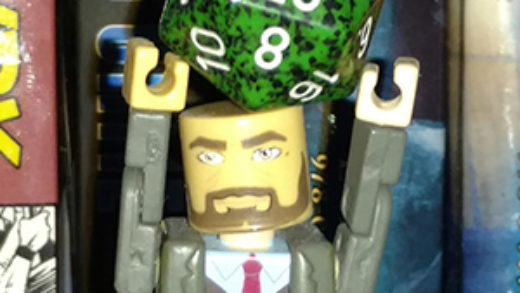Call of Cthulhu is considered the granddaddy of horror tabletop roleplaying but, like non-euclidean geometry, it sits in a strange place in the world of gaming. Is it really best suited as a one-shot or can it be a long-term campaign? And, if we are running a campaign, how should that work?
I was introduced to Call of Cthulhu in the late 80’s while attending NanCon, one of the gaming conventions in Houston at that time. This, along with Paranoia, became one of the quintessential convention games. In both situations, there was no expectation of character longevity; characters were expected to be dead (or worse) by the end of the game. The idea that the horrors in this particular universe could be stretched into a campaign never entered my mind.
I wasn’t alone. For a lot of gamers, the idea of Call of Cthulhu is almost strictly in the realm of a one- or two-shot game. The entire purpose of the game is for player characters to “go insane,” die, or both. Many of the published adventures lean in this direction as well. This sets an expectation that, despite advancement rules built into the Basic Roleplaying System, advancement rarely occurs; as if the notion is simply a holdover from the core rules originally presented in RuneQuest.
The notion of Call of Cthulhu only being a one-shot game is contradicted by the campaign supplements offered for the game. Masks of Nyarlathotep and Horror on the Orient Express are very popular, but are not alone in the multi-session scope of the game. However, the treatment of these “mega adventures” is largely in the hands of the Keeper and players. Masks is written as a short series of five adventures and depending on a group’s pacing could be wrapped up in five sessions.
Most horror tabletop roleplaying system scenarios are written as “Monster of the Week” style games (including the Powered by the Apocalypse game of the same name). A campaign my have an arc and a “big bad” at the end, but each session presents a monstrous foe to investigate and defeat. Due to varying life schedules with my players, I’ve run most of my campaigns using the idea of encapsulated sessions. I’ve compared my own style to that of a TV show. Each session represents an episode, with a campaign being a “season.” Campaigns could have multiple seasons or be wrapped up after the first, depending on the group.
At the start of 2020, my semi-monthly Call of Cthulhu: Down Darker Trails campaign, Bag of Nails lost two of its newer players. They were almost exclusively Call of Cthulhu players and had very specific ideas of what a CoC campaign should look like. For them, the five adventure Masks of Nyarlathotep could take countless sessions, moving at a slow burn and introducing tension incrementally.
It takes a very specific and dedicated group to be able to play in the style that can keep a Call of Cthulhu campaign going for multiple sessions in a way that conforms to the CoC universe. Admittedly, my own game does not, in the traditional sense. I use BRP and all the rules, but my own style is very ad-hoc and I tend to favor more action beats and a little less investigation. Given I have a player base that continues to show up for the games, I don’t think I’m a bad GM, but I am not a typical “Keeper.” …If that distinction makes sense.
There’s a sense that, even in the long run, the characters in a Call of Cthulhu campaign, like its one-shots, won’t last. It’s been interesting in my current group that certain players are willing and expecting to let their characters go but the rest of the group doesn’t want that to happen—they push rolls, and do everything in their power to help characters escape death.
This is the curse of the Call of Cthulhu campaign. With rare exceptions the majority of GMs I’ve spoken with have a certain feeling of “impostor syndrome” when expanding the universe into something long-term for their players, especially if making home-brewed adventures or not strictly adhering to a prepared module.
BUT! If so many GMs are running our multi-scenario Call of Cthulhu campaigns in more of a Monster of the Week style and our players keep returning for more, then are we really doing it “wrong?” My answer is: no. Regardless of the system and its baked-in flavor and expectations, so long as the table is enjoying themselves (remember to check in with your players and GM frequently), then there’s no wrong way to summon a Great Old One.


Recent Comments